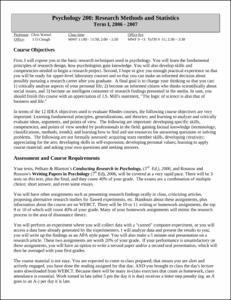Please use this identifier to cite or link to this item:
http://hdl.handle.net/10267/3577Full metadata record
| DC Field | Value | Language |
|---|---|---|
| dc.contributor.author | Wetzel, Chris | - |
| dc.date.accessioned | 2009-03-10T16:19:54Z | - |
| dc.date.available | 2009-03-10T16:19:54Z | - |
| dc.date.issued | 2006-08-29 | - |
| dc.identifier.uri | http://hdl.handle.net/10267/3577 | - |
| dc.description | This syllabus was submitted to the Office of Academic Affairs by the course instructor. | en_US |
| dc.description.abstract | First, I will expose you to the basic research techniques used in psychology. You will learn the fundamental principles of research design, how psychologists gain knowledge. You will also develop skills and competencies needed to begin a research project. Second, I hope to give you enough practical experience so that you will be ready for upper-level laboratory courses and so that you can make an informed decision about possibly pursuing a research career after you graduate. A final goal is to change your thinking so that you can: 1) critically analyze aspects of your personal life, 2) become an informed citizen who thinks scientifically about social issues, and 3) become an intelligent consumer of research findings presented in the media. In sum, you should finish this course with an appreciation of J.S. Mill's statement, "The logic of science is also that of business and life." In terms of the 12 IDEA objectives used to evaluate Rhodes courses, the following course objectives are very important: Learning fundamental principles, generalizations, and theories; and learning to analyze and critically evaluate ideas, arguments, and points of view. The following are important: developing specific skills, competencies, and points of view needed by professionals in the field; gaining factual knowledge (terminology, classifications, methods, trends); and learning how to find and use resources for answering questions or solving problems. The following are not formally assessed: acquiring team member skills, developing creativity; appreciating for the arts; developing skills in self-expression; developing personal values; learning to apply course material; and asking your own questions and seeking answers. | en_US |
| dc.language.iso | en_US | en_US |
| dc.publisher | Memphis, Tenn. : Rhodes College | en_US |
| dc.relation.ispartofseries | Syllabi CRN | en_US |
| dc.rights | Rhodes College owns the rights to the archival digital images in this repository. Images are made available for educational use only and may not be used for any non-educational or commercial purpose. Approved educational uses include private research and scholarship, teaching, and student projects. For additional information please contact archives@rhodes.edu. | - |
| dc.subject | Psychology, Department of | en_US |
| dc.subject | Syllabus | en_US |
| dc.subject | Curriculum | en_US |
| dc.subject | Academic departments | en_US |
| dc.subject | Text | en_US |
| dc.subject | 2006 Fall | en_US |
| dc.title | PSYC 200-01, Research Methods and Statistics, Fall 2006 | en_US |
| dc.type | Syllabus | en_US |
| Appears in Collections: | Course Syllabi | |
Files in This Item:
| File | Description | Size | Format | |
|---|---|---|---|---|
| 2006_fall_PSYC_200-01.pdf | 101.77 kB | Adobe PDF |  View/Open |
Items in DSpace are protected by copyright, with all rights reserved, unless otherwise indicated.